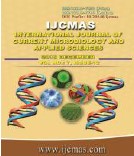


 National Academy of Agricultural Sciences (NAAS)
National Academy of Agricultural Sciences (NAAS)

|
PRINT ISSN : 2319-7692
Online ISSN : 2319-7706 Issues : 12 per year Publisher : Excellent Publishers Email : editorijcmas@gmail.com / submit@ijcmas.com Editor-in-chief: Dr.M.Prakash Index Copernicus ICV 2018: 95.39 NAAS RATING 2020: 5.38 |
Fabaceae is one of the most diversified and complex family of flowering plants. The important pulses and the medicinally important plant species under this family have a high market value. Now a day, adulteration in the food and herbal medicinal products has become a severe problem. Adulteration of therapeutic herbs and major pulses with related or conflicting species has proved to be hazardous to human health in several cases. We have projected here, a PCR-based method using some of the major universal DNA barcode primers from the plastid region to address this problem. The basic idea behind this study was to utilize the amplicon length polymorphisms exhibited by these primers to differentiate the plant species. PCR amplification success and species discrimination ability of five major DNA barcode primers (trnH-psbA, trnL, atpF-atpH, matK and rbcL) was studied among 24 representative plant species of Fabaceae family. The results showed that the primers atpF-atpH, trnH-psbA and trnL exhibited amplicon length polymorphism can simultaneously discriminate all the 24 species under study whereas the primers rbcL and matK produced monomorphic band and hence failed to do so. Differentiation of plant species on the basis of amplicon length polymorphism which can be clearly visualized on agarose gel and does not require sequencing hence it is a noble and cheap approach to discriminate plant species and to check adulteration. This technique can give the way to identify adulteration both in herbal drug formulations as well as in processed food materials.
 |
 |
 |
 |
 |